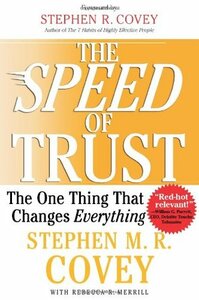Take a photo of a barcode or cover
informative
inspiring
reflective
medium-paced
Review of concept from 7 habits, although explores it a little futher. Best serves me as a substitute to rereading 7 habits which i do about every 5 years. Just different enough to make me pay attention instead of glossing over.
The son of the late legendary Stephen R.Covey brings us The Speed of Trust, a book that chronicles the impact of trust on every aspect of life and business.
There are multiple levels at which trust operates:-
1. Self trust
2. Relationship trust
3. Organizational trust
4. Market trust
5. Societal trust
For each level of developing trust, the author provides concrete tips to implement and behaviours to emulate. This is a great book for business students, leaders, coaches and anyone else interested in understanding how trust shapes our lives.
There are multiple levels at which trust operates:-
1. Self trust
2. Relationship trust
3. Organizational trust
4. Market trust
5. Societal trust
For each level of developing trust, the author provides concrete tips to implement and behaviours to emulate. This is a great book for business students, leaders, coaches and anyone else interested in understanding how trust shapes our lives.
This book really made me re-evaluate a lot of my work relationships and perspectives on people/trust. Although repetitive and a little too “case study” focused for me, I do think it made good points.
I really liked the principles in this book and agree with it wholeheartedly. It was just a little long-winded. The book could have been 30% shorter and delivered the same message.
The message this book brings is outstanding! Covey identifies and discusses four core elements of trust -- integrity, intent, capabilities, and results. In some sense, he has simply redefined trust from what others have said about it. While I don't necessarily disagree, it is to some extent a matter of semantics. From that discussion of the core of trust, though, he moves into a very useful and relevant discussion and justification of 13 behaviors that create or sustain trust. Moving on, Covey takes us through his ideas of the third, fourth, and fifth waves of "stakeholder trust -- organizational trust, market trust, and societal trust.
All in all, I think there are a goodly number of worthwhile discussions and points made in the book. Its worth reading it and thingking about it, and pausing from time to time to read and think even more deeply. Even better, take the training offered by CoveyLink...it brings the material in the book to life.
All in all, I think there are a goodly number of worthwhile discussions and points made in the book. Its worth reading it and thingking about it, and pausing from time to time to read and think even more deeply. Even better, take the training offered by CoveyLink...it brings the material in the book to life.
While Covey (son of the 'famous' Covey)sets out a great argument for trust in businesses, I, of course, look through the lens of an educator. I think the part that resonated the most with me was the first section on self trust, and the section about organizational trust. Sometimes I found the parallels, sometimes I didn't.
Self trust...believing in your mission, your purpose. Trusting YOURSELF to make good decisions, to reach out to others, to inspire trust. That is exactly what should happen in a classroom.
And the other section, about organizations, helped me look, not only at my own school, but the profession and helped me analyze part of the reason public education seems so mired in disfunction right now. We don't trust each other. We're coming from different stances, we don't understand, and we haven't taken the time to really trust.
One thing that I kept noticing, like an underlying theme, is a huge problem I have with corporate reform...the need to change, be different, mix things up. That's what 'reformers' are doing. They're playing with education, with my profession. Let's try this, let's try that. It's kids' lives they're messing with as they try this, and then try that. BUT that's the climate they're comfortable with, because they are not dealing with lives...they're dealing with services or products. They can afford to be very very wrong...they just start over with new products. We in education have to pick up wounded kids and try to restore their confidence...So, I feel like I understand better.
The thing about trust is that it has an opposite, and also a counterfeit. The opposite is easy. The counterfeit? What an interesting concept. That's the person who tells you she trusts you while she's plotting something that will work to her advantage and your disadvantage. Wow. I know people (men and women) who can do that with ease.
I got tired of counting...five waves, 13 behaviors...I got tired of the Covey vocabulary...tax, dividend, withdrawals, deposits...Kept wondering why 5, why 13. That actually distracted me as I would count them off...
Lots of great lines...some of Covey's and some he's found to illustrate his points.
What Gandhi thinks, what he says and what he does are all the same...
My life is an indivisible whole, and all my activities run into one another. My life is my message ~ Gandhi
Listen First means to listen to yourself, to your gut feelings, your own inner voice before you decide, before you act
Trust men and they will be true to you; treat them greatly and they will show themselves great.
Leadership is getting results in a way that inspires trust.
The illiterate of the 21st century will not be those who cannot read and write, but those who cannot learn, unlearn, and relearn ~ Alvin Toffler
You may be deceived if you trust too much, but you will live in torment if you don't trust enough ~ Frank Crane
Extending trust to others rekindles the inner spirit
AND: HIGH TRUST COMPANIES OUT PERFORM LOW TRUST COMPANIES. That brings me back to my education parallels. We are now living and working in a climate of little or NO trust. Yet we're being punished if we don't reach the results OTHERS ('reformers') have set for us. We don't trust them; they sure as heck don't trust us. The climate is toxic until someone begins to trust. I see it at the state level with our SDE; and at the national level.
I saw no solution in this book, no breakthrough...but I did find inspiration to go back to my classroom and build that trust, one student at a time!
Self trust...believing in your mission, your purpose. Trusting YOURSELF to make good decisions, to reach out to others, to inspire trust. That is exactly what should happen in a classroom.
And the other section, about organizations, helped me look, not only at my own school, but the profession and helped me analyze part of the reason public education seems so mired in disfunction right now. We don't trust each other. We're coming from different stances, we don't understand, and we haven't taken the time to really trust.
One thing that I kept noticing, like an underlying theme, is a huge problem I have with corporate reform...the need to change, be different, mix things up. That's what 'reformers' are doing. They're playing with education, with my profession. Let's try this, let's try that. It's kids' lives they're messing with as they try this, and then try that. BUT that's the climate they're comfortable with, because they are not dealing with lives...they're dealing with services or products. They can afford to be very very wrong...they just start over with new products. We in education have to pick up wounded kids and try to restore their confidence...So, I feel like I understand better.
The thing about trust is that it has an opposite, and also a counterfeit. The opposite is easy. The counterfeit? What an interesting concept. That's the person who tells you she trusts you while she's plotting something that will work to her advantage and your disadvantage. Wow. I know people (men and women) who can do that with ease.
I got tired of counting...five waves, 13 behaviors...I got tired of the Covey vocabulary...tax, dividend, withdrawals, deposits...Kept wondering why 5, why 13. That actually distracted me as I would count them off...
Lots of great lines...some of Covey's and some he's found to illustrate his points.
What Gandhi thinks, what he says and what he does are all the same...
My life is an indivisible whole, and all my activities run into one another. My life is my message ~ Gandhi
Listen First means to listen to yourself, to your gut feelings, your own inner voice before you decide, before you act
Trust men and they will be true to you; treat them greatly and they will show themselves great.
Leadership is getting results in a way that inspires trust.
The illiterate of the 21st century will not be those who cannot read and write, but those who cannot learn, unlearn, and relearn ~ Alvin Toffler
You may be deceived if you trust too much, but you will live in torment if you don't trust enough ~ Frank Crane
Extending trust to others rekindles the inner spirit
AND: HIGH TRUST COMPANIES OUT PERFORM LOW TRUST COMPANIES. That brings me back to my education parallels. We are now living and working in a climate of little or NO trust. Yet we're being punished if we don't reach the results OTHERS ('reformers') have set for us. We don't trust them; they sure as heck don't trust us. The climate is toxic until someone begins to trust. I see it at the state level with our SDE; and at the national level.
I saw no solution in this book, no breakthrough...but I did find inspiration to go back to my classroom and build that trust, one student at a time!
Such a quick read, very short. I understand the need for trust but I still didn’t really takeaway the “how”. The book references the “Smart Matrix” and “Smart Trust”, si perhaps that’s explained in the next book.
I could easily relate to many of the scenarios. I definitely have a lot to think about as I step into a new role.




